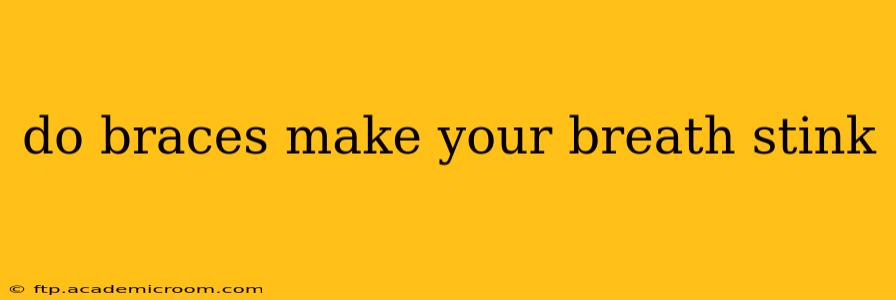Many people wonder if getting braces leads to bad breath. The short answer is: yes, braces can contribute to halitosis (bad breath), but it's not inevitable. Understanding the reasons why and how to mitigate the issue is crucial for maintaining fresh breath and healthy teeth throughout your orthodontic treatment.
Why Do Braces Sometimes Cause Bad Breath?
Braces create numerous nooks and crannies where food particles can easily get trapped. These trapped particles, combined with saliva and bacteria, contribute to plaque buildup. This plaque is the primary culprit behind bad breath. The intricate design of braces makes it challenging to thoroughly clean all areas, leading to a greater accumulation of bacteria and food debris compared to having straight teeth.
What Types of Food Contribute to Bad Breath with Braces?
Certain foods are more likely to become lodged in and around your braces, leading to increased bad breath. These include:
- Sticky foods: Candy, caramel, gummy bears, and other sticky treats can cling stubbornly to your braces and are difficult to remove with regular brushing.
- Starchy foods: Bread, pasta, and chips can break down into sugars that feed bacteria, leading to increased plaque and bad breath.
- Foods with small particles: Seeds, popcorn kernels, and nuts can easily get stuck in your braces, providing a breeding ground for bacteria.
How Can I Prevent Bad Breath with Braces?
Maintaining excellent oral hygiene is paramount to preventing bad breath while wearing braces. Here's a comprehensive approach:
Brushing:
- Technique: Use a soft-bristled toothbrush and gentle, thorough brushing techniques. Pay close attention to the areas around and underneath your braces. Consider using an interdental brush or floss threader to clean between your brackets and wires.
- Frequency: Brush your teeth at least twice a day, ideally after every meal.
- Type: Consider an electric toothbrush with a specialized head for braces. These can be more effective at removing plaque in hard-to-reach areas.
Flossing:
- Technique: Flossing is crucial for removing food particles from between your teeth and under your wires. Use a floss threader to easily guide the floss under your wires.
- Frequency: Floss at least once a day.
Mouthwash:
- Type: Use an antimicrobial mouthwash to kill bacteria and help neutralize odors. Look for mouthwashes containing fluoride for added protection.
- Frequency: Use mouthwash once or twice a day, following brushing and flossing.
Regular Dental Checkups:
Regular dental checkups and professional cleanings are essential. Your orthodontist and dentist can remove plaque and tartar buildup that you might miss during at-home cleaning. These appointments also allow for monitoring of your oral health and addressing any issues early on.
Does Bad Breath Indicate a Problem Beyond Braces?
While braces can contribute to bad breath, persistent bad breath despite good oral hygiene could indicate other underlying problems. These may include:
- Gum disease: Inflamed gums can harbor bacteria and contribute to halitosis.
- Dry mouth: A lack of saliva can reduce the natural cleansing action of the mouth, leading to bacterial buildup.
- Medical conditions: Certain medical conditions can also cause bad breath.
If you experience persistent bad breath despite diligently following good oral hygiene practices, it's crucial to consult your dentist or orthodontist. They can accurately diagnose the cause and recommend appropriate treatment.
What if My Breath Still Smells Bad After Trying Everything?
If you've tried all the recommended strategies and still experience persistent bad breath, consult your orthodontist or dentist. They can examine your mouth thoroughly, rule out other potential causes, and provide personalized guidance. They might suggest additional cleaning methods or recommend a referral to a specialist if necessary.
By understanding the causes of bad breath associated with braces and implementing these preventative measures, you can maintain fresh breath and a healthy smile throughout your orthodontic journey. Remember, consistency is key!
